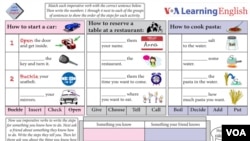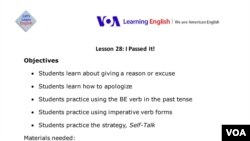Let's Learn English (Tiếng Anh cơ bản) là một khóa học tiếng Anh mới. Các giáo viên dạy tiếng Anh-Mỹ đã soạn thảo khóa học này cho những người mới bắt đầu. Khóa học sẽ kéo dài trong 52 tuần.
Mỗi tuần sẽ có một bài học mới bằng video cho thấy cuộc sống của giới trẻ Mỹ. Bài học giúp trau dồi kỹ năng nói, viết và từ vựng.
Ngoài ra cũng sẽ có các bài thực hành có thể in ra, bảng đánh giá và kế hoạch học tập cho cá nhân và giáo viên dạy tiếng Anh. Chúng tôi khuyến khích các bạn theo dõi các bài học hàng tuần và chia sẻ sự tiến bộ của bạn với chúng tôi qua phần ý kiến và email.
Tóm lược (Summary)
Anna tells her roommate, Marsha, about the problems she had in her driving test. Then Anna says she wants to drive to a special place in Washington, D.C. Where will she drive?
Anna kể với bạn cùng phòng Marsha của cô về những vấn đề mà cô gặp phải khi thi bằng lái. Sau đó Anna nói cô muốn lái tới một nơi đặc biệt ở Washington, D.C. Cô ấy sẽ lái tới đâu vậy?
Nói (Speaking)
Learn to pronounce the new words for this lesson. You can also learn about the imperative verb form.
Cách phát âm (Pronunciation)
Use this video to learn about how people say "well" to give bad news, or an answer someone does not expect.
Phần đối thoại (Conversation)
Anna: Hello! Guess what this is? This is my driver’s license! I passed my driving test!
Today, I rented a car so I can drive around Washington, D.C. You can see more of the city this way. Marsha!
Marsha: Anna, did you get your driver’s license?
Anna: I did! But it was not easy.
Marsha: Why? What happened?
Anna: Well, you know, I can drive farm equipment really well. But I was really nervous driving in Washington, D.C. traffic!
Marsha: Did you pass the test the first time?
Anna: Well…no. But I did pass the second time.
Marsha: What happened during the first test?
Anna: It started fine.
John: Okay … Anna. Is your seatbelt buckled?
Anna: Yes, sir!
John: Great. Please start the car.
Anna: (to herself) Okay, Anna, start the car.Started the car. Good job, Anna.
John: Why are you talking to yourself?
Anna: I am a little nervous. When I’m nervous, I talk to myself.
John: You don't need to be nervous.
Anna: Listen to that engine!
John: Please, stop pushing the gas pedal!
Anna: Sorry.
John: Okay, when you are ready, turn.
Anna: Great!
John: Not now! You almost hit that car!
Anna: You said “turn!”
John: Look first! There were cars in the street.
Anna: Please don’t yell at me!
John: I’m sorry! I was afraid.
Anna: You were yelling.
John: Look out for that car! Brake! Brake!!
Anna and John: Ahhh!
Anna: Why is everyone honking at us?
John: You were driving too slow! Anna, stay on the street!
John: Hands on the wheel, Anna.
Anna: What’s that sound?
John: That, Anna, is the police.
Marsha: That sounds awful.
Anna: Yes, it did not go well. But, I practiced and passed the second time!
Marsha: Do you know where you want to take your first drive in Washington, D.C.?
Anna: Yes! Let’s go!
Anna: There it is … the White House!
Marsha: Anna, you do you know you can’t drive up to the White House, don’t you?
Anna: Yes. No. I didn’t know. I guess we walk from here!
Anna: Sometimes you can see more of Washington, D.C. in a car. If you want to see the White House, you need to walk. Until next time … !
Viết (Writing)
Do you know how to drive a car? Were you nervous when you first learned? Write to us by email or in the Comments section.
Click on the image below to download the Activity Sheet and practice using imperative verbs with a friend.
Sách lược học tập (Learning Strategy)
Learning Strategies are the thoughts and actions that help make learning easier or more effective.
The learning strategy for this lesson is Self-Talk. When we need to be more confident, we can use Self-Talk.
In this lesson, Anna uses Self-Talk. Notice that John asks her about it.
John: Why are you talking to yourself?
Anna: I am a little nervous. When I’m nervous, I talk to myself.
John: You don't need to be nervous.
Talking to yourself in English can have two benefits. It may help you relax and do better. It can also give you more chance to practice using English.
How about you? Do you sometimes talk to yourself? Write to us in the Comments section or
send us an email. Teachers, see the
Lesson Plan for more details on teaching this strategy.
Bài kiểm tra (Quiz)
Listen to short videos and test your listening skills with this quiz.
Quiz - Lesson 28: I Passed It!
Start the Quiz to find out
______________________________________________________________
Từ ngữ mới (New Words)
afraid - adj. feeling fear
brake - v. to use the brake on a vehicle
- n. a device for slowing or stopping something (such as a wheel or vehicle)
buckle - v. to fasten (something, such as a belt) with a buckle
equipment - n. supplies or tools needed for a special purpose
gas pedal - n. a pedal in a vehicle that is pressed down to make the vehicle go faster
Guess what? - expression. a phrase used to build anticipation
pass / passed - v. to complete a test or a class successfully
police - n. the people or the department of people who enforce laws, investigate crimes, and make arrests
seat belt - n. a strap on a vehicle's seat that holds a person in the seat if there is an accident
tractor - n. a short, heavy truck that is designed to pull a large trailer
traffic - n. all the vehicles driving along a certain road or in a certain area
turn - v. to move in a particular direction and especially toward the left or right
turn signal - n. one of the lights on a vehicle that flash to indicate that the vehicle is turning left or right
White House - n. the place in Washington, D.C., where the U.S. President lives
yell - v. to say (something) very loudly especially because you are angry, surprised, or are trying to get someone's attention
______________________________________________________________
Tài liệu miễn phí (Free Materials)
Download the VOA Learning English Word Book for a dictionary of the words we use on this website.
Each Let's Learn English lesson has an Activity Sheet for extra practice on your own or in the classroom. In this lesson, you can use it to practice talking about associations with sports and warnings using "look out."
Phần dành cho giáo viên (For Teachers)
See the Lesson Plan for this lesson for ideas and more teaching resources. Send us an email if you have comments on this course or questions.
Grammar focus: Imperative verb forms, Past tense of BE
Topics: Giving a reason or excuse, Apologizing
Learning Strategy: Self Talk
Speaking & Pronunciation Focus: Imperative verbs, Extending the word "well"
______________________________________________________________
Now it's your turn. Send us an email or write to us in the Comments section below or on our Facebook page to let us know what you think of this lesson.



